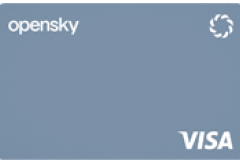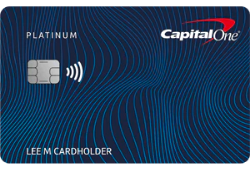Best Credit Cards for Bad Credit
Getting approved for a credit card is never guaranteed, even if you have a spotless financial record. Your chances are worse if you’ve got a FICO score below 580 and a troubled or non-existent credit history.
That doesn’t mean you can’t get a credit card. In fact, getting a card and using it responsibly can be a great way to start rebuilding your credit. Luckily, there are plenty of credit cards that can help you achieve your goals.
To assist you in making a smart decision, we’ve made a list of the top-rated secured and unsecured cards. Choose one of these cards, use it responsibly, and your credit score will start to improve in no time.
Best Credit Cards for Bad Credit in February 2026


opensky® Secured Visa® Credit Card
Fortunly's Rating: Our editorial team determines the rating based on a set of evaluation criteria developed for each product and service category.
opensky® Secured Visa® Credit Card
- The streamlined 5-step application process allows you to quickly and easily apply for this card.
- You don’t need a bank account in order to get this card, as the security deposit can be made with a money order or via Western Union
- Monthly 3-bureau reports guarantee that your credit improvements will be recorded in a timely manner


First Progress Prestige Secured Mastercard® Credit Card
Fortunly's Rating: Our editorial team determines the rating based on a set of evaluation criteria developed for each product and service category.
First Progress Prestige Secured Mastercard® Credit Card
- There is no credit score minimum for this card, allowing users even with extremely bad scores to get a hold of it and start building back credit.
- The variable APR of 13.49% is fairly low, especially among credit cards for people with bad credit.
- Credit card issuer does not initiate hard credit checks which would further destabilize your score
- Earn 1% cash back rewards
- Credit reporting with Equifax, Experian and TransUnion


Capital One Platinum Secured Credit Card
Fortunly's Rating: Our editorial team determines the rating based on a set of evaluation criteria developed for each product and service category.
Capital One Platinum Secured Credit Card
- See if you qualify for a Capital One Platinum Secured credit card without hard credit checks.
- This card has no annual fees.
- The bank can increase your credit limit within six months.
Top 3 Credit Cards for Bad Credit - Our Picks for 2026:
- OpenSky Secured Visa Credit Card - Best if you don’t have a bank account
- First Progress Platinum Prestige Mastercard - Best for low APR
- Capital One Platinum Secured Credit Card - Best if you want a fee-free card
Our Methodology for Evaluating Credit Cards for Bad-Credit Applicants
Credit cards that accept bad-credit applicants usually come with relatively high interest rates, low credit limits and with fewer perks. At least, that’s what consumers expect.
In reality, cards that help you establish or rebuild your credit profile come in many different flavors.
Fees
You can’t apply for a credit card with bad credit and expect not to be charged anything. Fees and interest payments are how credit card companies make money, after all.
Still, you should keep in mind that not all cards impose the same fees nor have the same qualifying terms.
As a cardholder, some of the most common costs you’ll face include annual membership fees, application fees, transaction fees such as cash-advance charges and foreign-transaction costs, and penalties for late and returned payments.
Note that some or all of these fees are often waived, if only for the first year, as part of a card issuer’s introductory offer.
APR
Most of these credit cards charge a variable annual percentage rate. The APR is typically high.
The interest rate may not matter, however. If you’re using this card primarily as a way to help build or rebuild a favorable credit score, you should try to pay the full balance every month anyway - so the interest rate is purely academic.
This strategy simultaneously limits your costs and helps boost your credit rating.
Credit Limit
A credit limit is the maximum amount a credit card issuer will let you spend in a month. Credit limits on unsecured cards are based on your credit score and the card issuer’s policies.
Secured credit cards typically come with limits equivalent to the amount of the security deposit.
High initial credit limits on these cards are rare. However, there are banks that offer secured cards with a credit limit as high as $3,000 as long as you can afford to put down a matching deposit. Alternatively, you can call your card issuer or try any of the other ways to increase your credit limit.
Credit Bureau Reporting
Getting a credit card to help you build your credit profile and qualify for opportunities that are reserved for people with a higher credit score range is a solid plan.
However, you won’t improve your credit history unless the card issuer reports information about your on-time monthly payments to the three major credit bureaus.
The most trusted credit cards are the ones whose issuers send reports to Equifax, Experian, and TransUnion on a monthly basis.
Credit Score
Most of the cards offered to poor-credit applicants don’t come with fixed credit-score qualification requirements. Still, keep in mind that most credit card banks will perform a “hard” credit check before issuing a card. Each credit check costs your FICO score a few points.
This is especially important if you plan on applying for several cards in a short time, which we don’t advise to anyone.
Boosting your credit score is one of the main reasons to sign up for a card. Reducing your score by applying to a whole bunch of cards is contrary to the whole point.
Detailed Reviews of Credit Cards for Bad Credit
The opensky secured Visa credit card stands out among credit card offers for bad-credit applicants because of its low annual fee and APR. While this card won’t earn you any rewards, you’ll reap the benefits of avoiding high charges and “hard” credit inquiries.
If you’ve been having trouble getting approved for a credit card because you don’t have a bank account, you’ll be happy to hear that you won’t face that obstacle with the opensky secured VisaⓇ card.
Credit Limit, APR, and Fees
Your security deposit can range from $200 to $3,000. The amount you put down will determine your credit limit. A higher deposit doesn’t always assure you a higher limit, however; credit limits are subject to approval.
This credit card doesn’t provide an introductory APR. Cardholders are subject to a variable rate that currently stands at 23.89% for purchases and cash advances.
The opensky secured VisaⓇ card comes with a $35 annual fee. Additional costs are relatively low and include a 3% foreign-transaction fee and a cash-advance fee of $6 or 5% of the amount.
Late payments incur a fee of up to $41 and you can be charged up to $25 each time your payment is returned.
Reasons to Choose the opensky Secured VisaⓇ Credit Card
Opensky's secured VisaⓇ card has a simple five-step application process that won’t affect your credit score.
Additionally, opensky doesn’t require you to have a bank account - you can make your security deposit with a money order, a debit card or Western Union transfer.
Because it reports to Equifax, Experian, and TransUnion every month, this is an excellent card for consumers who need to establish or rebuild their credit rating.
Another great thing about this opensky option is that it comes with all the benefits of a Visa credit card, including worldwide acceptance.
It also lets you set up email alerts to remind you about payment deadlines. Better yet, you can set up automatic payments using the website or free mobile app.
Reasons to Explore Other Options
The opensky secured Visa card has two main drawbacks. First, it charges an annual fee. Although some cards have higher membership fees, some don’t impose such charges at all.
Second, it doesn’t offer an upgrade path to an unsecured credit card after establishing a history of responsible use.
In other words, as your credit score rises enough to make you eligible for unsecured credit-building credit cards, you’ll need to close your opensky secured Visa account, which could hurt your credit, or keep it open and pay the annual fee.
First Progress Prestige Secured Mastercard® Credit Card
 Learn More
Learn More
On Official Website
Read In-Depth ReviewThe First Progress Prestige Secured Mastercard® is a low-APR secured card that not only lacks minimum credit score requirements, but also doesn’t subject prospective cardmembers to “hard” credit inquiries.
This credit card may not offer a sign-up bonus or a rewards program, but it’s a solid option for consumers who are in the market for a simple credit-building solution.
Credit Limit, APR, and Fees
First Progress offers three secured options for low-credit applicants. Each of them requires a refundable security deposit of $200 to $2,000. The deposit effectively determines the cardholder’s credit limit.
The only real difference distinguishing the three First Progress cards are their annual fees and APRs.
The Prestige charges an annual membership fee of $49 and a variable-rate APR that is currently 13.49%. When it comes to other costs, you’ll find them moderate.
This credit card comes with a 3% foreign-transaction fee and a cash-advance fee of $10 or 3%, whichever is greater.
There’s also a late-payment charge that can go up to $41 and a maximum returned-payment penalty of up to $30.
Reasons to Choose the First Progress Prestige Secured Mastercard®
One of the things that make the Prestige Mastercard one of the most popular options among consumers on a mission to build or rebuild their credit profiles is that it regularly reports payment information to the three major credit bureaus, Equifax, Experian and TransUnion.
Additionally, applying for the Prestige Mastercard won’t have a negative effect on your credit profile.
As long as you use the card responsibly, you’ll be a step closer to qualifying for an unsecured solution, a mortgage, or a personal loan.
Another advantage of this card is its low APR - a novelty in the secured-card market. Still, carrying a balance from month to month isn’t a good idea: It essentially means that you’ll be paying interest on a loan you’ve given to yourself. Finally, you can earn 1% cash back rewards.
The First Progress Prestige Secured Mastercard® credit card is available nationwide.
Reasons to Explore Other Options
The card’s low APR is offset by the $49 annual fee, which is posted to your account automatically, reducing your effective limit until it’s paid. This is especially important if you have made a low security deposit.
This credit card is issued by Capital One, an American financial institution that offers a wide range of products, including credit cards, savings accounts, loans, and more.
The bank is based in Virginia, but operates in all states. Capital One is an FDIC-insured bank, and it is one of the largest banks in America.
Credit Limit, APR, and Fees
The Capital One credit card is a secured product, meaning that you’ll need to deposit collateral to obtain it. The minimum amount you need to place is either $49, $99, or $200. After you deposit the money, the bank will transfer your initial credit limit of $200.
If you want to get a higher initial credit limit, you need to deposit more money. The credit line maximum is $1000.
On the downside, the Capital One Platinum Secured credit card has a high APR - one of the highest we’ve seen so far. The APR for both cash advances and purchases is 26.99%.
As mentioned, the primary advantage of this credit card is the $0 annual fee. Other fees are similar to other credit cards. For example, the transaction fee for a cash advance will be either $10 or 3% of the advance, whichever is greater.
The transfer fee is 3%, and there is also a late payment charge of up to $40.
Reasons to Choose the Capital One Platinum Secured Credit Card
Aside from zero annual costs, there are other reasons to apply for this credit card. First of all, there’s a mobile app you can use to manage your account, set up automated payments, and track your spending. It’s an invaluable tool for boosting your credit score.
Another great thing about this card is the zero fees for foreign transactions. If you use the card for purchasing outside the US, the bank will not charge you anything. On top of that, the card is protected with various security features.
For instance, if your credit card is stolen, the bank won’t charge you for transactions you do not make, and will immediately notify you if someone tries to use your card without permission.
The Capital One Platinum Secured credit card is an excellent option if you have a poor credit score you want to rebuild. The main advantage on this front is that you have an ability to get prequalified without a hard credit check.
Reasons to Explore Other Options
The Capital One Platinum Secured Credit Card has many great features, but it’s not flawless. For one thing, it has a high rate for both purchases and cash advances.
Many other credit cards with more affordable APRs can help you rebuild your credit score and qualify for better cards, too.
How to Build or Rebuild Your Credit Score
Acquiring a credit card for bad credit won’t make much sense if that’s the only step you take toward building good credit. Whether you’re establishing your credit profile for the first time or correcting existing problems, the process is likely to take lots of time and require careful decision-making.
Following the four guidelines below will help you put your FICO score on the road to gradual improvement.
Check Your Credit Reports
Make sure to request a copy of your credit report from the three major credit bureaus once a year. Check each credit file thoroughly and if you find any items that seem inaccurate or incorrect, be sure to send a dispute letter.
Pay Off Your Debts
You shouldn't even consider applying for credit cards until you’ve at least made a plan on how to sort out your debts. We suggest you prioritize the payments and stick to a realistic repayment schedule.
While we agree that this is easier said than done, finding the right and risk-free debt management strategy will be a crucial step on your credit-building journey.
Don’t Overspend
It’s important for everyone to avoid impulse purchases - and it’s essential for those who are committed to improving their credit. Even if you manage to find a low-APR option among the credit card offers, make sure to pay your balance in full every month - on time.
The deal is simple: If you manage to keep your balances low and you don’t spend beyond your means in any way, your credit utilization ratio will decrease and your credit score will rise, giving you greater flexibility.
Make a Plan and Stick to It
There are many factors when it comes to rebuilding your credit history, and a single mistake can destroy all of your hard work. Pick a credit card that meets your needs and stop there. Avoid opening and closing accounts unless you absolutely need to.
Both the length of your credit history and recent activity play important roles when it comes to establishing your score and offsetting past mistakes.



